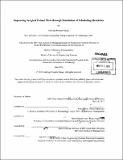Improving surgical patient flow through simulation of scheduling heuristics
Author(s)
Range, Ashleigh Royalty
DownloadFull printable version (13.38Mb)
Other Contributors
Leaders for Global Operations Program.
Advisor
Retsef Levi and David Simchi-Levi.
Terms of use
Metadata
Show full item recordAbstract
Massachusetts General Hospital (MGH) is currently the nation's top ranked hospital and is the largest in New England. With over 900 hospital beds and approximately 38,000 operations performed each year, MGH's operating rooms (ORs) run at 90% utilization and their hospital beds at 99% operational occupancy. MGH is faced with capacity constraints throughout the perioperative (pre-, intra-, and postoperative) process and desires to improve throughput and decrease patient waiting time without adding expensive additional resources. This project focuses on matching the intraday scheduling of elective surgeries with the discharge rate and pattern of patients from the hospital floor by investigating ways surgeons could potentially schedule their cases within a given OR block. To do this, various scheduling rules are modeled to measure the impact of shifting patient flow in each step of the perioperative process. Currently the hospital floor proves to be the biggest bottleneck in the system. Delays in discharging patients result in Same Day Admits (patients that will be admitted to the hospital post-surgery) waiting for hospital beds in the Post Anesthesia Care Unit (PACU). These patients wait more than sixty minutes on average after being medically cleared to depart the PACU. A simulation model is built to evaluate the downstream effects of each scheduling rule and discharge process change. The model takes into account physical and staff resource limitations at each of the upstream and downstream steps in the perioperative process. By scheduling Same Day Admits last in each OR block, patient wait time in the PACU can be reduced up to 49%. By implementing the recommended changes the system will realize lower wait times for patients, less stress on the admitting and nursing staff, and a better overall use of the limited physical resources at MGH.
Description
Thesis (M.B.A.)--Massachusetts Institute of Technology, Sloan School of Management; and, (S.M.)--Massachusetts Institute of Technology, Engineering Systems Division; in conjunction with the Leaders for Global Operations Program at MIT, 2013. Cataloged from PDF version of thesis. Includes bibliographical references (p. 79).
Date issued
2013Department
Leaders for Global Operations Program at MIT; Massachusetts Institute of Technology. Engineering Systems Division; Sloan School of ManagementPublisher
Massachusetts Institute of Technology
Keywords
Sloan School of Management., Engineering Systems Division., Leaders for Global Operations Program.